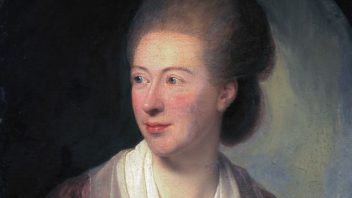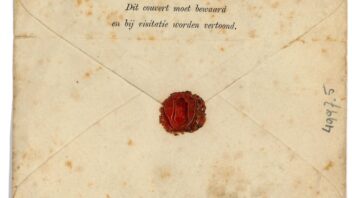All digitalised letters of Belle
Belle van Zuylen is one of the best-known women in Dutch literary history, with an extensive body of work. Besides her essays, books, poems, musical pieces, pamphlets and other publications, she also wrote over 2,600 letters from the mid-eighteenth century onwards, to family and friends, as well as to famous contemporaries. Her most famous quote, ‘I have no talent for subordination’, comes from one of the letters – from letter 98 to be precise. From 27 September 2024, all the letters will be accessible to everyone online.
The project to digitise all her letters began over a decade ago, in 2012, as a collaboration between the Huygens Institute and a group of volunteers, most of whom are members of the Belle van Zuylen Society. Led by Suzan van Dijk and Madeleine van Strien-Chardonneau, the digitisation project is started. Readability is an important reason. The letters were published by Uitgeverij Van Oorschot in six volumes, but in that form they are difficult to get through – not because of the content, but because of the layout. The font is small, the pages are thin, and the letters are printed the way Belle van Zuylen wrote them: using all the paper she had available. The text runs in one piece, without paragraphs.
Moreover, making the letters publicly accessible fits with the Huygens Institute’s mission to show a more diverse picture of the history and culture of the Netherlands. That includes voices of women, and that of Belle van Zuylen, with her important position within Dutch cultural history, in particular.
After scanning all the letters page by page, OCR was applied to them, whereby text in an image can be converted into machine-readable text using software. It was then up to the volunteers to clean up these digitised texts and add modernised spelling and punctuation. In addition, footnotes and metadata were added to the letters for necessary context.
Not only does it read more pleasantly, the digitisation and transcription and thus searchability offers opportunities to look at the letters differently. This was another disadvantage of the printed letters: the only way to search the texts was with the help of the index. Anyone reading the letters, however, soon finds out that Van Zuylen was a woman with a complex personality, who wrote with empathy and empathy about her own life and its concerns, but also about the state of the world, important social questions and scientific ideas. Moreover, as a historical source, letters give us a unique insight into daily life at the time: they show us what habits people had, how they ate, how they travelled, what codes of conduct applied and what ideas were discussed. In short, an index does not justify the number of possible themes to explore and questions to answer. Digital searchability does give that possibility. It can also take a lot of work off researchers’ hands: computers can gather data to analyse, find connections and compare with other databases.
For instance, the letters can provide insight into how people in the eighteenth century got their books. Belle van Zuylen wrote a lot about this: not only what she thought of the books, but also how she got them and what choices she made in them. For instance, some books she wanted to read but not have herself. In a broader perspective, digitisation also makes network analysis easier, which can answer entirely different questions: how Van Zuylen in her correspondence, for instance, corresponds or differs from her contemporaries, with whom she discusses which ideas and how these develop through time and in relation to other thinkers.
Her correspondence only becomes more valuable when embedded in other networks. This is why Belle van Zuylen’s letters are also included in the SHEWROTE database. This new database, being developed under the direction of professor Alicia Montoya of Radboud University in Nijmegen, aims to provide insight into how women’s work was read and received. This is another of the many possibilities of the digitisation of Belle van Zuylen’s letters: research into the reception of her and her work.
One of the things that makes Belle van Zuylen unique is her transnationality. As a Dutch person who, like many of the elite in the eighteenth century, wrote in French with an international company and eventually emigrated, she was part of different cultures. It is therefore only fitting that all her letters, provided with translations, are now available for all to read. Wijnand Mijnhardt once said: those who read contemporaries find out what it must have been like in the 18th century, but those who read Belle van Zuylen also gain insight into themselves.
Sanne Stevens is a historian and a writer. She founded Het Schrijfkantoor (the writing office) after a bachelor’s and master’s degree in history at Erasmus University. She wants to write down the best stories and share them with the world. Stories that make people think.




